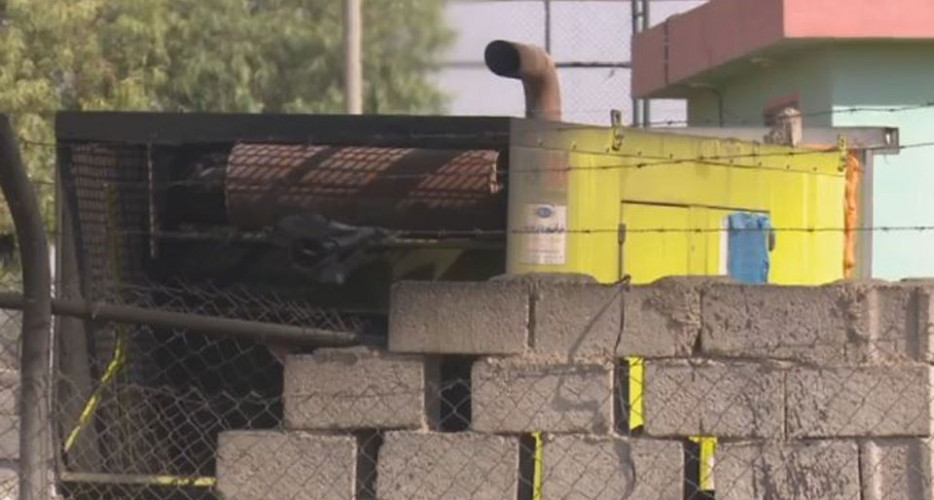Generating toxins: thousands of electricity generators in the Kurdistan Region pose risk to people’s health

Peregraf- Surkew Mohammed
Suffering from lung cancer, Khawar's husband needs clean air and a quiet place, which has become impossible at their own home because of the constant roaring noise and toxic smoke from the neighborhood generator only 50 meters away from their house.
"It is true that generators are less loud than the previous years, but they are annoying and the smoke harms our health," she said. In order to get some peace and clean air, the couple had to sell their house and move elsewhere.
There are private generators in most of the Kurdistan Region’s neighborhoods, especially during the peak cold and hot seasons, such as winter and summer, to fill in for the lack of public electricity.
The gasoline used by the private generators is produced in unlicensed fields without monitoring, mixed with contaminated oil and other chemicals that release dangerous toxins in the air, Ali Hama Salih, head of the Kurdistan Region parliament's Energy and Natural Resources Commerce and Industry Committee, told Peregraf.
Hama Salih added that several studies on the threats of the fuel used by generators have been given to the officials in vain, noting that these generators are "generating poison."
The Kurdistan Region’s Board of Environment is aware of that. Its spokesperson, Razaq Khaylani told Peregraf the fuel produced by some of the local refineries is toxic - they sell it in the name of gasoline and the generator owners buy it and use them because it is cheaper.
There are more than 5,500 private generators across the Kurdistan Region. Khaylani says the fuel used by private generators is "very bad quality and a threat to the environment and health."
Dilshad Sadiq, head of Erbil’s private generators said they use fuel from local refineries to operate. "Although we are constantly investigating the quality of the gasoline that generator owners use, some don’t have to feel responsible for the environment and use low quality gas, and many generator owners have been punished for this," he said.
Private generators have been installed since 2007 across the Kurdistan Region due to poor public electricity – they are set for daily use in neighborhoods, hotels, residential complexes and bazaars. They operate independently without supervision and will only be checked up by mayoral offices if there are complaints.
The Kurdistan Regional Government (KRG) gave generator owners 450 dinars per liter for several years – this prevented the use of bad quality gas as well as the price of electricity on citizens, but the assistance was later cut off.
The head of Erbil’s private generator council believes that the best solution to prevent the use of bad quality fuel is to distribute it again "otherwise controlling the use of quality gas cannot be done."
Some owners deny that they use harmful fuel. Tariq Samin, the head of the Sulaimaniyah’s private generators said "the generators that work in Sulaimaniyah neighborhoods will break down if they used bad quality gas, so generator owners are forced to use high-quality gas."
"Bad quality gas is used in the generators of Erbil and Duhok cities because the quality of the generators are low and they work with all kinds of gases," added Samin.
In the area where these generators are installed, owners are required to plant a set amount of greens annually to compensate for the environmental pollution they cause. They are also conditioned to use high-quality and noiseless generators and otherwise be punished. Yet, the problem remains.
In research conducted by Sangar Salih, head of the chemistry department at Salahaddin University, it shows the fuel used by these generators does not meet any international or local standards.
"The gas that private generators release into the air is a disaster and 95 percent of the fuel used to run private generators in the cities of the region not world-standard quality, not even Iraqi-standard quality, and they do not meet any standard qualities," Salih said – adding that none of the local gasoline pass lab tests.
There are a large number of illegal oil refineries in the Kurdistan Region, where several types of fuel products are made and marketed without supervision or quality control - most of which are used for electricity generators.
The refineries themselves have caused major environmental pollution; they have a clear and visible effect on the air, water and soil. They have become a source of dangerous diseases as they have ignored their environmental obligations at the cost of people's well-being.
The KRG repeatedly issued decisions since 2010 to close them. However some of them are still running because they are ironically backed by a ruling party, namely the government itself.
According to the International Agency for Research on Cancer (IARC), gasoline and diesel, even if their quality meets international standards, are a reason for cancer.
"The chemicals that are mixed with gasoline have a direct negative impact on human health, especially children, as well as cancer," Chinar Sanjawi, head of cancer control department at the KRG’s ministry of health, told Peregraf.
Statistics from the ministry of health say 6,293 cancer patients have been registered in the Region last year, more than half of them women.